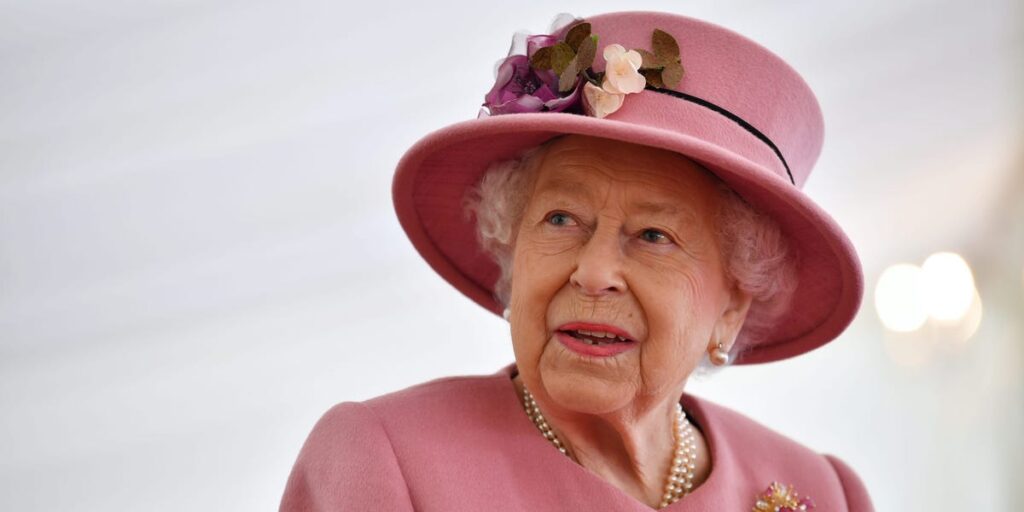- Former Prime Minister Boris Johnson wrote in his memoir that Queen Elizabeth II had bone cancer.
- Experts say royals have historically kept their medical information private for different reasons.
- King Charles III has tried to use his health struggles to help others.
After Queen Elizabeth died on September 8, 2022, her official cause of death was listed as old age.
But former UK Prime Minister Boris Johnson wrote in his upcoming memoir, “Unleashed,” that the monarch had bone cancer before her death, as an excerpt published by The Daily Mail revealed. The book will be released in the UK on October 10 and in the US on October 15.
“I had known for a year or more that she had a form of bone cancer, and her doctors were worried that at any time she could enter a sharp decline,” he wrote in a passage about a visit with the Queen in September 2022, just days before her death.
Johnson also said the Queen’s private secretary, Edward Young, told him that she “had known all summer that she was going,” though that was not made public.
Johnson’s revelation wasn’t completely new, as royal biographer Gyles Brandreth said the Queen had bone marrow cancer in his 2022 book, “Elizabeth: An Intimate Portrait.” Buckingham Palace declined to comment on the book at the time of its publication.
The late monarch’s decision to keep her health private isn’t atypical for a royal — but it is unusual for a former prime minister to share intimate details of a monarch’s health.
Buckingham Palace did not respond to a request for comment from Business Insider.
Medical privacy in the monarchy
Members of the royal family, particularly those on the throne, have often kept their medical matters private.
Historian, author, and royal commentator Carolyn Harris told BI that under King George VI’s reign, privacy was indicative of the larger culture around medicine at the time. Queen Elizabeth II’s father died of lung cancer, which Harris said George himself may not have seen coming.
“For many members of the public, it came as a shock that he died when he did, and certainly for his family as well,” she said, noting that Elizabeth and Prince Philip had just left for a royal tour ahead of his death.
“That reflects the 1950s when it was thought to be upsetting to both the patient and to the patient’s family and to the public as well to speak of cancer,” Harris said.
Royal watcher Kristen Meinzer also noted that the media landscape of much of the 1900s was intrinsically friendlier to offering public figures privacy than our modern era is.
“The Queen, over the course of her lifetime, saw a huge change in the media landscape and thus how information about the royal family was disseminated,” she said. “It was easier if the royals wanted to be private about their health 100 years ago to just not say anything.”
The Queen and Prince Philip carried on her father’s legacy of privacy, but Harris said their motivation was likely slightly more strategic than King George VI’s.
“Both Queen Elizabeth II and Prince Philip always wanted the headlines to be focused on the work of the monarchy rather than their individual health conditions,” Harris said.
For instance, Harris said Philip chose to retire from public life in 2017 so “there wouldn’t be feverish press speculation every time he was absent for a royal event.” He died in 2021 at the age of 99.
Likewise, the Queen made multiple appearances in her last year of life despite her declining health, attending her Platinum Jubilee in June 2022. Just two days before she died, she met Liz Truss at Balmoral Castle in Scotland to appoint her as the new prime minister.
Meinzer echoed Harris, noting that the Queen never even formally announced her pregnancies.
Changing times
As Harris told BI, Johnson’s detailing of the Queen’s health in his memoir is unusual for a former prime minister.
“The conversations between the sovereign and the prime minister are supposed to take place in confidence, and that’s why there’s so much curiosity about conversations that take place behind palace doors,” Harris said.
She added that some recent prime ministers have been slightly more candid about their private audiences with the Queen, including David Cameron to the Queen’s reported displeasure.
Harris said medical details about royals have traditionally only been revealed in authorized biographies, though King Charles III seems to be taking a more modern approach to his health.
Charles and Kate Middleton, the Princess of Wales, were both diagnosed with cancer in 2024, and the king, in particular, was intentional about sharing that he was undergoing surgery for an enlarged prostate in January.
“I think so much of King Charles III’s life, both his public life and his private life, have unfolded before the media, so it’s clear that he feels more comfortable engaging with the media,” Harris said.
Harris and Meinzer pointed to the biography “The Prince of Wales,” which the king worked on with Jonathan Dimbleby in the 1990s, as an example of his openness to the media.
“I think King Charles III sees the benefit of the public being aware of the monarch going through these various health procedures,” Harris said.
After he announced he was undergoing a procedure for an enlarged prostate in January, the NHS page about prostate enlargement saw a surge in daily visitors.
Although the king’s openness has made a positive impact, and Kate recently shared that she finished chemotherapy, Meinzer doesn’t think they will reveal intimate details about their treatments in the coming months.
“Maybe eventually there will be another memoir or biography that Charles collaborates on or that Kate collaborates on,” Meinzer said. “I wouldn’t expect that anytime soon, but it’s always a possibility.”
Read the full article here


